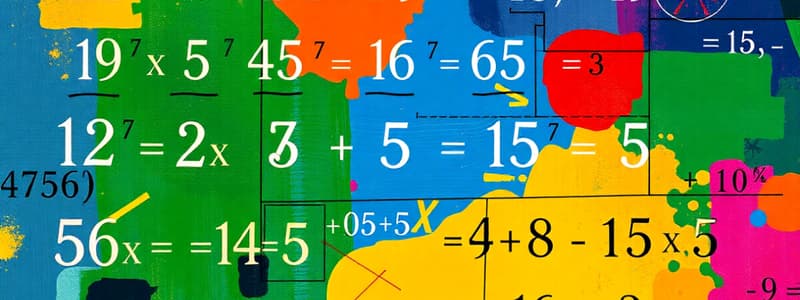Podcast
Questions and Answers
What is the primary component of a literal calculation?
What is the primary component of a literal calculation?
- Graphical representations
- Numerical values only
- Geometric shapes
- Variables and constants (correct)
Which expression represents a literal calculation?
Which expression represents a literal calculation?
- $x^2 - y + 7$ (correct)
- $5 + 3$
- $10 imes 4$
- $3.14 imes r^2$
In a literal calculation, what role do variables play?
In a literal calculation, what role do variables play?
- They represent unknown quantities. (correct)
- They limit the size of the calculations.
- They replace constants in calculations.
- They serve only as placeholders without value.
What is NOT a benefit of using literal calculations?
What is NOT a benefit of using literal calculations?
When simplifying $3x + 5x$, the result is:
When simplifying $3x + 5x$, the result is:
Flashcards
Literal Calculation Component?
Literal Calculation Component?
Variables and constants are the primary components.
What is a Literal Calculation?
What is a Literal Calculation?
It is an expression like: $x^2 - y + 7$
Role of Variables?
Role of Variables?
Variables represent unknown values or quantities.
Benefit of Literal Calculations?
Benefit of Literal Calculations?
Signup and view all the flashcards
Simplify $3x + 5x$
Simplify $3x + 5x$
Signup and view all the flashcards
Study Notes
Literal Calculations
- Literal calculations are mathematical expressions that involve variables and constants.
- Variables are letters that represent unknown values.
- They rely on the principles of algebra to perform operations.
- An example of a literal calculation is $3x + 5x$, where "x" represents an unknown value.
- Variables in literal calculations represent specific values, and their role is to hold the place of those unknown values.
- The benefit of using literal calculations is to simplify complex expressions and find solutions to problems.
- They help in understanding how different variables interact within an expression.
Simplifying Expressions
- When simplifying $3x + 5x$, the result is $8x$.
- This simplification uses the distributive property of multiplication.
- It allows us to combine like terms, resulting in a simplified expression.
Studying That Suits You
Use AI to generate personalized quizzes and flashcards to suit your learning preferences.




